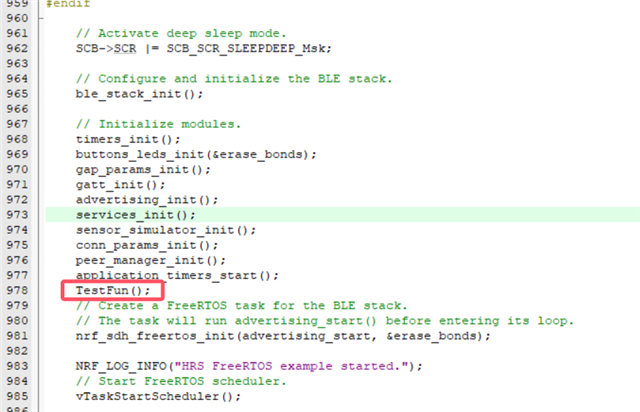I tested on nrf5_sdk_17.1.0_ddde560,Tested on nrf5_sdk_17.1.0_ddde560\examples\ble_peripheral\ble_app_hrs_freertos project。Call the testfun function to test the test。
The location where I called the function execution is shown in the image
#include "nrf_fstorage.h"
#include "nrf_sdh.h"
#include "nrf_sdh_ble.h"
#include "nrf_fstorage_sd.h"
#include "nrf_soc.h"
#include "app_error.h"
#define EE_DEVICE_ADDR (0xE0000)
#define EE_DEVICE_ADDR_BP (0xE1000)
void wait_for_flash_ready(nrf_fstorage_t const * p_fstorage);
static void fstorage_evt_handler(nrf_fstorage_evt_t * p_evt);
static void print_flash_info(nrf_fstorage_t * p_fstorage);
void WritetoFlash(uint32_t Address, uint8_t *pdata, uint16_t Len);
NRF_FSTORAGE_DEF(nrf_fstorage_t fstorage) =
{
/* Set a handler for fstorage events. */
.evt_handler = fstorage_evt_handler,
/* These below are the boundaries of the flash space assigned to this instance of fstorage.
* You must set these manually, even at runtime, before nrf_fstorage_init() is called.
* The function nrf5_flash_end_addr_get() can be used to retrieve the last address on the
* last page of flash available to write data. */
.start_addr = 0xE0000,
.end_addr = 0xE3000,
};
void NordicFlashInit(void)
{
ret_code_t rc;
nrf_fstorage_api_t * p_fs_api;
p_fs_api = &nrf_fstorage_sd;
rc = nrf_fstorage_init(&fstorage, p_fs_api, NULL);
APP_ERROR_CHECK(rc);
print_flash_info(&fstorage);
}
void DeinitFlash(void)
{
nrf_fstorage_uninit(&fstorage, NULL);
}
void EraseflashStorage(void)
{
ret_code_t ret_code;
ret_code = nrf_fstorage_erase(&fstorage, 0xE0000, 1, NULL);
APP_ERROR_CHECK(ret_code);
}
void EraseflashStorageBk(void)
{
ret_code_t ret_code;
ret_code = nrf_fstorage_erase(&fstorage, 0xE1000, 1, NULL);
APP_ERROR_CHECK(ret_code);
}
uint8_t TestFun(void)
{
uint8_t buffer[] = {1,2,3,4};
NordicFlashInit();
EraseflashStorage();
EraseflashStorageBk();
WritetoFlash(EE_DEVICE_ADDR, (uint8_t*)&buffer, 4);
WritetoFlash(EE_DEVICE_ADDR_BP, (uint8_t*)&buffer, 4);
return 0;
}
static void print_flash_info(nrf_fstorage_t * p_fstorage)
{
#if ENABLE_PRINTF_DEUBG
printf("\r========| flash info |========\n");
printf("\rerase unit: \t%d bytes\n", p_fstorage->p_flash_info->erase_unit);
printf("\rprogram unit: \t%d bytes\n", p_fstorage->p_flash_info->program_unit);
printf("\r==============================\n");
#endif
}
static void fstorage_evt_handler(nrf_fstorage_evt_t * p_evt)
{
if (p_evt->result != NRF_SUCCESS)
{
#if ENABLE_PRINTF_DEUBG
printf("--> Event received: ERROR while executing an fstorage operation.");
#endif
return;
}
switch (p_evt->id)
{
case NRF_FSTORAGE_EVT_WRITE_RESULT:
{
#if ENABLE_PRINTF_DEUBG
printf("--> Event received: wrote %d bytes at address 0x%x.",
p_evt->len, p_evt->addr);
#endif
} break;
case NRF_FSTORAGE_EVT_ERASE_RESULT:
{
#if ENABLE_PRINTF_DEUBG
printf("--> Event received: erased %d page from address 0x%x.",
p_evt->len, p_evt->addr);
#endif
} break;
default:
break;
}
}
void wait_for_flash_ready(nrf_fstorage_t const * p_fstorage)
{
/* While fstorage is busy, sleep and wait for an event. */
while (nrf_fstorage_is_busy(p_fstorage))
{
}
}
void WritetoFlash(uint32_t Address, uint8_t *pdata, uint16_t Len)
{
ret_code_t rc;
rc = nrf_fstorage_write(&fstorage, Address, pdata, Len, NULL);
APP_ERROR_CHECK(rc);
wait_for_flash_ready(&fstorage);
}


